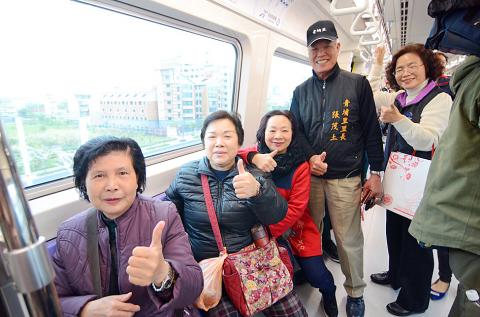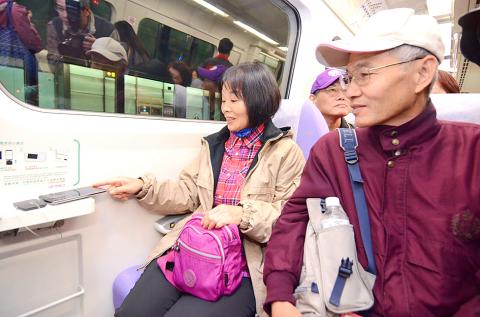The Taiwan Taoyuan International Airport Mass Rapid Transit (MRT) line began trial runs yesterday, with free rides being offered to the public in two phases over the course of one month before commercial operations begin on March 2, Taoyuan Metro Corp said.
In the first phase, which is to run through Feb. 15, group passengers who apply in advance are to be allowed to travel for free between 8am and 4pm, the company said
During this phase, passengers are to be restricted to boarding and disembarking at only six of the 21 stations, which do not include the two stations serving Taiwan Taoyuan International Airport, it added.

Photo: Lee Jung-ping, Taipei Times
The six stations are Taipei Main Station (A1), New Taipei Industrial Park Station (A3), Linkou Chang Gung Memorial Hospital Station (A8), Shanbi Station (A10), Taoyuan High Speed Rail Station (A18) and Huanbei Station (A21), or north link, the company said.
In the second phase, which is to start on Feb. 15 and run through March 1, a daily maximum of 40,000 free rides between 8am and 4pm will be offered to individual passengers who obtain numbered tags at the stations at 7:40am, 9:40am, 11:40am and 1:40pm, the company said, adding that passengers will have access to all 21 stations during this phase.
Although luggage check-in services for airport passengers will be available at Taipei Main Station during the second phase, outbound passengers are advised not to use it until the line’s commercial operations begin on March 2.

Photo: Lee Jung-ping, Taipei Times
The first trial run traveled from Huanbei Station to Taipei Main Station, with Taoyuan Mayor Cheng Wen-tsan (鄭文燦) and Taoyuan City Council Speaker Chiu Yi-sheng (邱奕勝) leading about 160 local officials and residents aboard the new train.
Some people who rode the line described it as “the pride of Taoyuan,” while expressing hope that it would be profitable.
However, others said they felt uncomfortable during the journey on a windy section between Huanbei Station and Airport Terminal 2.
After the MRT starts commercial operations, passengers will be offered a 50 percent discount on all trips during the first month, the company said, adding that the trains will run from 6am to 11pm every day.

Intelligence agents have recorded 510,000 instances of “controversial information” being spread online by the Chinese Communist Party (CCP) so far this year, the National Security Bureau (NSB) said in a report yesterday, as it warned of artificial intelligence (AI) being employed to generate destabilizing misinformation. The bureau submitted a written report to the Legislative Yuan in preparation for National Security Bureau Director-General Tsai Ming-yen’s (蔡明彥) appearance before the Foreign Affairs and National Defense Committee today. The CCP has been using cognitive warfare to divide Taiwanese society by commenting on controversial issues such as Taiwan Semiconductor Manufacturing Co’s (TSMC, 台積電) investments in the

INVESTIGATION: The case is the latest instance of a DPP figure being implicated in an espionage network accused of allegedly leaking information to Chinese intelligence Democratic Progressive Party (DPP) member Ho Jen-chieh (何仁傑) was detained and held incommunicado yesterday on suspicion of spying for China during his tenure as assistant to then-minister of foreign affairs Joseph Wu (吳釗燮). The Taipei District Prosecutors’ Office said Ho was implicated during its investigation into alleged spying activities by former Presidential Office consultant Wu Shang-yu (吳尚雨). Prosecutors said there is reason to believe Ho breached the National Security Act (國家安全法) by leaking classified Ministry of Foreign Affairs information to Chinese intelligence. Following interrogation, prosecutors petitioned the Taipei District Court to detain Ho, citing concerns over potential collusion or tampering of evidence. The

‘COMPREHENSIVE PLAN’: Lin Chia-lung said that the government was ready to talk about a variety of issues, including investment in and purchases from the US The National Stabilization Fund (NSF) yesterday announced that it would step in to staunch stock market losses for the ninth time in the nation’s history. An NSF board meeting, originally scheduled for Monday next week, was moved to yesterday after stocks plummeted in the wake of US President Donald Trump’s announcement of 32 percent tariffs on Taiwan on Wednesday last week. Board members voted to support the stock market with the NT$500 billion (US$15.15 billion) fund, with injections of funds to begin as soon as today. The NSF in 2000 injected NT$120 billion to stabilize stocks, the most ever. The lowest amount it

NEGOTIATIONS: Taiwan has good relations with Washington and the outlook for the negotiations looks promising, Minister of Economic Affairs J.W. Kuo said Taiwan’s GDP growth this year is expected to decrease by 0.43 to 1.61 percentage points due to the effects of US tariffs, National Development Council (NDC) Minister Paul Liu (劉鏡清) said at a meeting of the legislature’s Economics Committee in Taipei yesterday, citing a preliminary estimate by a private research institution. Taiwan’s economy would be significantly affected by the 32 percent “reciprocal” tariffs slapped by the US, which took effect yesterday, Liu said, adding that GDP growth could fall below 3 percent and potentially even dip below 2 percent to 1.53 percent this year. The council has commissioned another institution